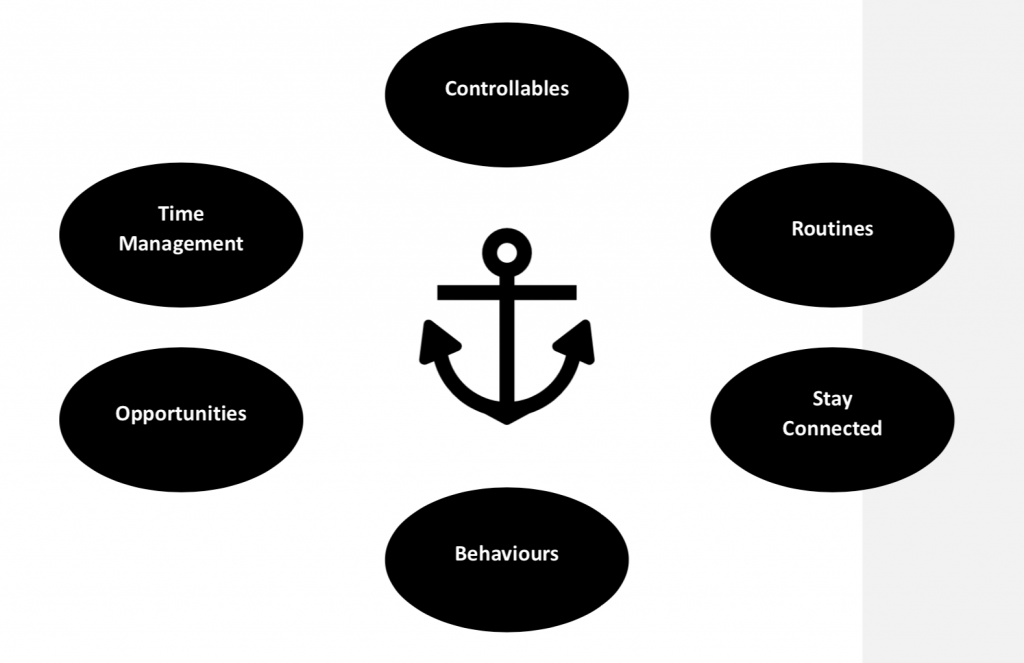The following article, which was written after the initial postponement of the 2020 Tokyo Olympic Games, has been shared with permission from High Performance Sport New Zealand.
We think there are many valuable lessons from this article that can also be applied to youth sport in light of the disruption to sport associated with the latest COVID-19 lockdowns across Aotearoa.
During periods where there is change, instability and the future is unpredictable, focusing on the things that help maintain wellbeing become increasingly important. The following are some suggestions on how you can support their balance and mental health of young people as they navigate challenges such as changes to plans, training restrictions, self-isolation, caring for family etc.

When the storm hits, the boats in the harbour drop anchor. If they don’t, they get swept out to sea. Dropping anchor does not make the storm go away, but instead keeps the boat steady until the storm passes. Young people can focus on the following six factors to help anchor them in order to remain balanced and healthy both physically and mentally.
Controllables
- Focus on the things that matter and the things they can control – it’s natural to drift into worry, rumination and the future
- Keep their attention in the present
- Be observant of their internal experiences (thoughts, feelings, sensations), take time to acknowledge and accept them, and then gently bring their attention back to the task at hand
Routines
- Maintain regular routines (sleep, nutrition, training, recovery), it reminds their brains that it is safe to dial the stress response back and enable them to focus on what is helpful
- Keep their routines as normal as possible, but be flexible as and when necessary
Connection
- Stay connected to their purpose, values and goals – they are the lighthouse when the sea is stormy and the night is dark
- Keep up regular connections with their support network. In times of challenge we need to increase support, so they might need to reach out more than usual. If they can’t do this face- to-face, then use all the tools at their disposal.
- Bring vulnerability to their connections with others, it‘s ok not to be ok
Behaviours
- Do the basics of personal self-care (quality food, time with loved ones, mindfulness etc) and ensure they put their own life jacket on first
- Maintain the hygiene basics – handwashing, social distancing, coughing/sneezing into their elbow, cleaning surfaces regularly
- Ask themself, what do I need to be doing for me and my community right now? Whatever the answer is, do it and engage with it fully
- Deliberately seek out people and stuff that make them happy. These times are hard for everyone, so if they have a choice between being hard on themself or others, or being compassionate and kind – choose kindness!
Opportunities
- Promote an opportunity vs. a threat mindset. Everyone is having to change plans and behaviours, if they can focus on the opportunities that new plan present, they will come through this in good shape, and maybe even better than their competitors.
- What does their new plan allow them to do that they might have been putting off, deprioritizing or ignoring (e.g. key relationships, tax returns, university studies, learning a new skill, updating social media, volunteering)? This might be a great time to get into some of these.
- Use this as an opportunity to refine their ability to stay present when under stress. While the challenges they might currently be facing now are not exactly like the ones they experience during performance, building these skills to manage their attention and unhelpful thoughts/emotions will be useful over the next few months and beyond.
Time Management
- Allocate a specific amount of time in their day to focus on coronavirus and government updates, what-ifs, worry etc. This will allow their brain to engage fully when they’re required to focus on other activities.
- Be aware of how much time they’re spending on media, which tends to be full of hype and non-factual information – put themself on a media diet.
- Ensure they maintain structure and purpose to their day, avoid energy vampires and time wasters: ask themself, is this activity/conversation helping me in my quest to function as well as I can right now?
For more detailed information/suggestions, please see further reading below.
Text or Call 1737 helpline
This is the national free to call or text helpline number. The service is staffed with fully trained counsellors and is available 24/7 for advice or support on anything to do with mental health and wellbeing.
Further Reading
‘Face Covid’ How to respond effectively to the Corona crisis – Dr Russ Harris, Author of ‘The Happiness Trap’
Real-time Resilience Strategies for Coping with Coronavirus – NZ Institute of Wellbeing and Resilience
Looking after mental health and wellbeing during COVID-19 – Mental Health Foundation
Image Credits: Ken Cheung on Unsplash







